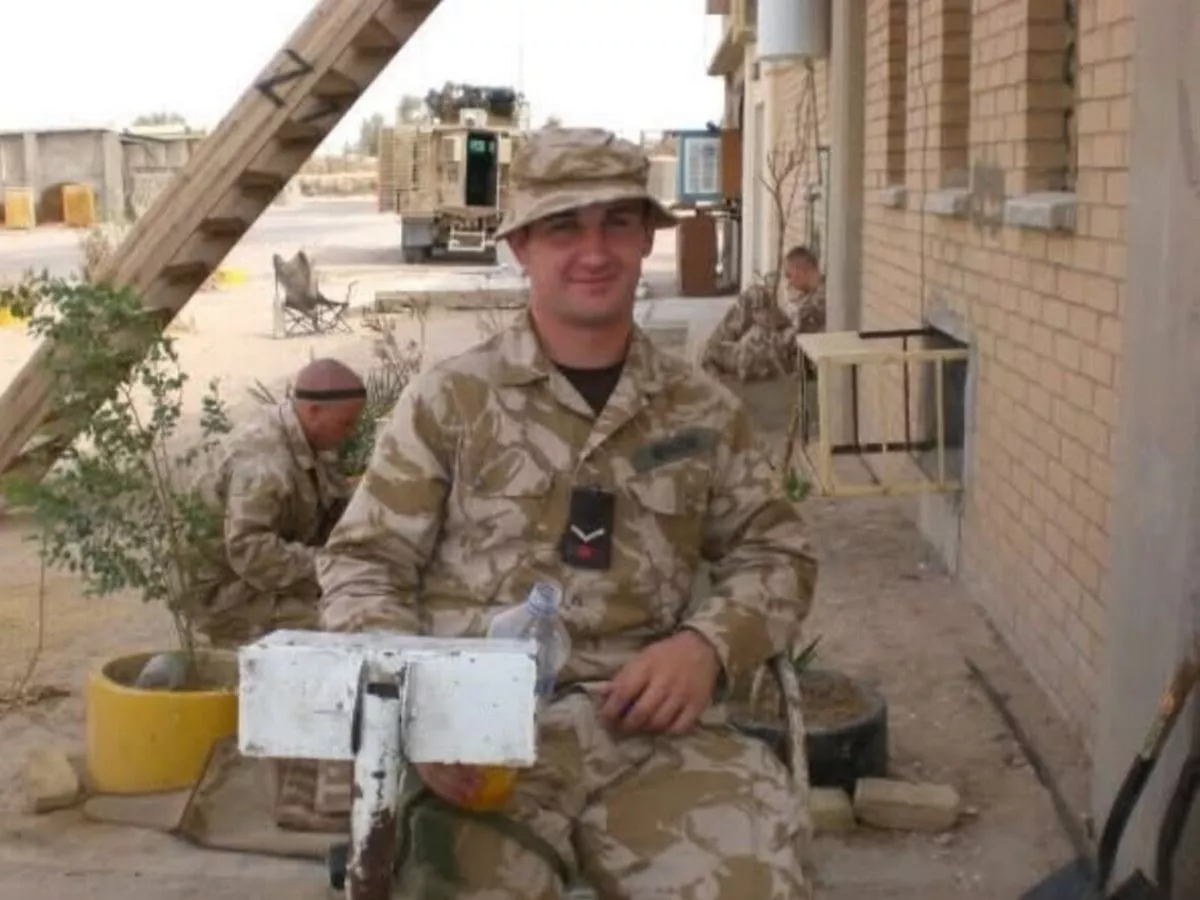Copyright mirror

The Royal British Legion say Britain’s Armed Forces and their families are "being let down badly by the country they sacrifice so much for”. Among the “thousands being failed” they highlight the disturbing treatment of a hero who suffers severe PTSD after four brutal tours of Iraq and Afghanistan . One of the tours was in 2009, the deadliest year with the highest number of casualties for UK forces with 100 deaths, including the bloodiest 48 hours of the conflict when eight were killed. Phill lost a lot of friends in Afghanistan in 2009 and was so convinced he was going to die, he asked Leanne to bring their marriage forward and she prepared their wedding day in six weeks so it was in time for his ten days leave. Leanne, 39, who has three children with Phill, now aged 22, 18 and 14, said: "We were due to be married in 2010 and he called me in 2009 and asked me to marry him a year earlier because he thought he might die." His wife said the dad-of-three “came back a different person” and his “scary” PTSD is so severe, medics have said he will never be able to work again. Phill Winton, 41, was awarded £1.7 million having to fight a seven-year legal battle with help from the RBL, but despite sacrificing his mental health for Britain, he has yet to receive the full compensation he is owed. Now on the eve of the Labour Party conference the Royal British Legion has released an Open Letter to Prime Minister Sir Keir Starmer urging him to ‘deliver on your promise’ to bring the Armed Forces Covenant “fully into law”. The RBL is urging the UK’s Armed Forces community, veterans and their families to sign to put pressure on the Government to take action. The covenant is the country’s national promise that those who serve or have served in the Armed Forces, and their families, are treated fairly and with respect, and are not disadvantaged in their day-to-day lives by their service. First introduced in 2011, the campaign by the nation’s beloved charity says for it to be “truly effective”, it needs bringing fully into law and across all Government departments, local authorities and devolved nations with funding and clear guidance. New YouGov research by the RBL, Britain's largest military charity, shows 67% of people have never heard of, or know little about the covenant, while a quarter of the Armed Forces community said the same. A spokesperson from the Royal British Legion said of the unfair treatment: “Many veterans like Phill face unacceptable delays for compensation, the lengthy and strenuous process causing untold distress to those in their time of need. Evidence suggests that delays for compensation are far greater in military cases than in civil cases which is a breach of the Armed Forces Covenant.” A Tank Commander in the Royal Tank Regiment, Phill Winton from Shropshire, was a highly regarded soldier with a bright future ahead of him. He started his service in the tank regiment in 2002 operating Britain’s fearsome main battle tank the Challenger, and by 2009 he’d already served two tours in Iraq and two tours in Afghanistan. Phill endured the hell of 2009 in Afghanistan, which saw Britain’s bloodiest and deadliest year when the nation could only watch in horror as the Union Jack-draped coffins on more than 100 bodies were repatriated home. What Phill experienced in that year, when combat fighting with the Taliban was intense and soldiers were being killed sometimes daily by lethal improved roadside bombs, left him developing complex PTSD for which he was finally medically discharged in 2022 when the severity of his condition was accepted. A tribunal last year heard of his extreme symptoms including night sweats, nightmares, slurred speech, nausea, and vomiting. At times, the symptoms became so severe that he tried to take his life. His specialist lawyer said it was the worst case of PTSD he had ever seen. In her witness statement, his wife Leanne gave a moving testimony detailing the tormenting symptoms that she’s seen her husband endure since 2009. “He came back as a different person,” she said. “I can see a relapse happening a few days before, he becomes withdrawn and empty. Not engaging, on edge, speech becomes slurred, he goes pale, gags and is sick.’ “On the day the relapse happens, he goes dizzy, tells me he feels numbs and starts being sick, he struggles to talk and then goes mute, and I know at that point I have lost him. He burns up, hot to touch, drips sweat and his breathing short and fast sobbing.’ “He shakes uncontrollably. He lies there powerless. It’s the scariest thing to watch. But I just have to make sure he isn’t going to hurt or cause himself harm." Despite the severity of Phill’s symptoms, he was determined to continue with his duties and to continue to provide for his family. He would serve for a further nine years before seeking help for his mental health. When he did seek support in 2017, a doctor quickly identified that he had developed full-blown PTSD eight years prior from that hellish tour of 2009. Even then, he returned to work and continued to serve for another four years, including a deployment to Estonia on Russia ’s border. But in 2021 he had a relapse, and a doctor found him unfit for military service and he was medically discharged. Leanne was forced to single-handedly financially support the family, while caring for their three children. She said, ‘I’m lost for words, it’s just fight after fight after fight, they just don’t care, it feels like you get medically discharged and that’s it ‘see you later’." Since making his first claim for ‘PTSD arising out of service’ in 2018, he has been through a lengthy process of multiple reviews and appeals. The experience has repeatedly triggered Phill’s PTSD and at his own hearing last year, he struggled to speak, due to the onset of symptoms. He feels let down by institutions which are meant to support him and by a process where he feels evidence was ignored, and information withheld. Leanne said: ‘“The military break them and then they go to the doctors and then they say ‘bring them home’ then what happens? ’ “He couldn’t work, he couldn’t pay bills, I was the only one that was working and that’s when the British Legion helped us the first time in 2023. It’s about time people realise how bad it is. “I work full time, with three young children and then look after him 24/7. It’s really not fair. The government say I’m not technically a carer because I work full time but I look after him every single day.’ “‘I fight it every single day, because there’s no help for us, as a spouse, there never has been any help. He tried to access therapy but “fell through the cracks. "It took three years before he was placed on the High intensity Therapy which he's just begun. “People look at us and think, wow a happy, strong family but nobody knows what it’s like.” An RBL spokesperson said: ‘We’re seeing unacceptable delays in compensations to veterans, with people waiting years to see the money they are due. “Entrenching the Armed Forces Covenant in Law will hold services accountable, to make sure those who served never suffer disadvantage as a result of service to their country. We’re calling on the government to “Keep the Covenant Promise”. ’ The RBL said they welcomed the Prime Minister’s pledge in June to commit the Covenant fully into law across all Government departments, devolved nations and to be adopted by UK local authorities. But they are now going to “hold the Government to account” to say there needs to be robust action to make their pledge meaningful. First written into law in 2011, following a successful campaign by the Royal British Legion, the Armed Forces Covenant is a promise from the nation to look after those in the Armed Forces community. The RBL’s campaign, which launches today, is backed up by their hard-hitting report, Keep the Covenant Promise, which sets out the scale of the problem and the impact failings are having on those who deserve better, showing Phill is sadly not alone and thousands more are being let down. Angela Kitching, RBL’s Director of Campaigns, Policy and Research, who will address members of the Labour Party on the fringe of their Conference in Liverpool this weekend, said: “It is deeply worrying that serving personnel, veterans and their families are being let down so badly by the country they sacrifice so much for. Every day, we see cases of veterans falling through the cracks of the systems meant to support them. “The Royal British Legion welcomed the Prime Minister’s commitment to extend the Armed Forces Covenant, now we urge him to Keep the Covenant Promise and deliver real change for our Armed Forces community to stop the unfair treatment.” The Royal British Legion is urging the Government to: Armed forces families say they feel they are being ‘punished’ for serving their country. The Royal British Legion say many of the Armed Forces are being failed by the covenant; denied proper access to housing, healthcare, education and pensions . The Royal British Legion say many of the Armed Forces are being denied proper access to housing, healthcare, education and pensions. A government spokesperson said: “We are already well underway in delivering our manifesto commitment to bring the Armed Forces Covenant fully into law, strengthening support for the Armed Forces community and placing them at the heart of decision-making across government. "This Government is totally committed to renewing the nation's contract with those who serve, veterans and their families." Dad of three, Lt Col James, aged 48, said it was as if the Covenant “didn’t exist” when the Home Office refused his civil servant wife’s remote working request. She wanted to keep the family together during his overseas posting after moving 11 times across the globe to follow James to Germany, Brunei, Kenya, which included one emergency evacuation. “I didn’t expect my biggest challenge after 24 years of service to be my own government,” he said. “This isn’t about special treatment,” he said. “It’s about fairness. About our government standing by its word. About not punishing families for serving their country.” Rebecca built her career around James’s, often giving up jobs and opportunities to support his service. So Rebecca was thrilled with her latest job as a Home Office civil servant and planned to work remotely when James accepted a NATO posting in Lille in 2024. Her manager backed her but when her application hit the desks at the Home Office and the Foreign Office, it was abruptly denied over visa and tax concerns. The dad said of the Armed Forces Covenant - the government's own pledge to protect military families from disadvantage: “It’s as if it didn’t exist. “Not in the Home Office, not in the Foreign Office, not anywhere that counted.” Forced to give up her job, Rebecca watched her long-held dream of working in the civil service collapse. She then faced further struggles getting her children school places when they returned to the UK. Pauline Cole, 79, from Eastbourne served in the Royal Corps of Signals and was awarded military compensation for PTSD and skin cancer, linked to her armed forces role. When she first applied for compensation for her malignant melanoma, the Ministry of Defence initially awarded her £12 a week which was increased to £80 per week after a tribunal and backdated for two years. However, unlike in civilian cases, this resulted in a dramatic benefit reduction and having to repay the Pension Credit she had received during that time. Since being diagnosed with further skin cancers in 2023, Pauline is due to go before another tribunal but fears if she wins further compensation, her Pension Credit will be cut further, and she’ll lose winter fuel allowance and other benefits. Pauline said: “I’m going to lose a lot if I win this case. If I’m awarded more money, it will go to the Government again. “They’ll likely cut my Pension Credit and I’ll lose winter fuel allowance, free dental care, free eye care and free prescriptions (which I need for mental health medication and more). I’m going to lose a lot if I win this case. "We fought for our country and got injured, and the Government takes our compensation. It’s wrong, and nobody is listening." “Compensation in civilian cases is not treated as income, so why is my military compensation? How does this fit with the Armed Forces Covenant?” Mum Cheryl, 37, originally from Preston now lives in Catterick, with her serving husband Chris, a medic, and their two children, Michael, six, and Annabelle, five, who both have special educational needs. Both children are autistic and struggle enormously when Chris is away. Chris has served nearly 20 years in the British Army, with deployments to Iraq and Afghanistan, and frequent periods away for training or exercises. Despite asking if Chris could be UK-deployable so to be closer to home in case of emergencies with his children, he is currently awaiting an overseas posting. “They’re amazing, beautiful children, inside and out. Even with their range of needs, we take the rough with the smooth and have a lovely family,” Cheryl says. “It’s hard to explain time to a child, especially when they’re nonverbal,” she says. “They just know Daddy’s not there. Annabelle becomes very dysregulated when he’s away. He’s her world .” “One occasion, Michael said to his teacher, ‘Daddy’s gone,’ and gave her a hug. He rarely speaks, so that really stuck with me.” Cheryl, a youth worker, said: “The average wait for an autism diagnosis now is about three to four years.. “But if you’re a military family, you usually move every two or three years, and every time you move, unless you push for the Armed Forces Covenant to be respected, you go right back to the bottom of the waiting list. “That means some families are stuck in this endless cycle of starting over, and their children miss out on vital support during those early years when intervention can make the biggest difference. “The Armed Forces Covenant helps in some areas, like maintaining your place on a waiting list, but it’s not always followed. “Local authorities vary. Some have an Armed Forces champion and take it seriously, like North Yorkshire. Others don’t. “We’re proud to be an Army family. I just want these last three years of Chris’s service to be calm - for him, for me, and for our children.”



